Project Management Practices, Methodologies, and Knowledge Areas
VerifiedAdded on 2022/09/18
|9
|1656
|17
Report
AI Summary
This report delves into the crucial aspects of project management, focusing on practices, methodologies, and knowledge areas. It begins by emphasizing the importance of project management practices for successful project completion, particularly in an IoT-based healthcare implementation. The report evaluates various project management processes and discusses the Agile methodology as a suitable approach for the project. It then explores PMBOK knowledge areas, including integration, scope, cost, time, and risk management, and their relevance in the healthcare context. The report also covers project process groups and roles, highlighting the phases of planning, execution, monitoring, controlling, and closing, as well as the importance of PMI's Code of Ethics. The conclusion summarizes the significance of project management in achieving project objectives and delivering desired outcomes, especially in healthcare, while stressing the need for aligning methodologies, processes, and knowledge areas for project success. The report emphasizes the importance of project management in healthcare for providing better patient care and the necessity of adopting appropriate methodologies and processes to achieve project success.
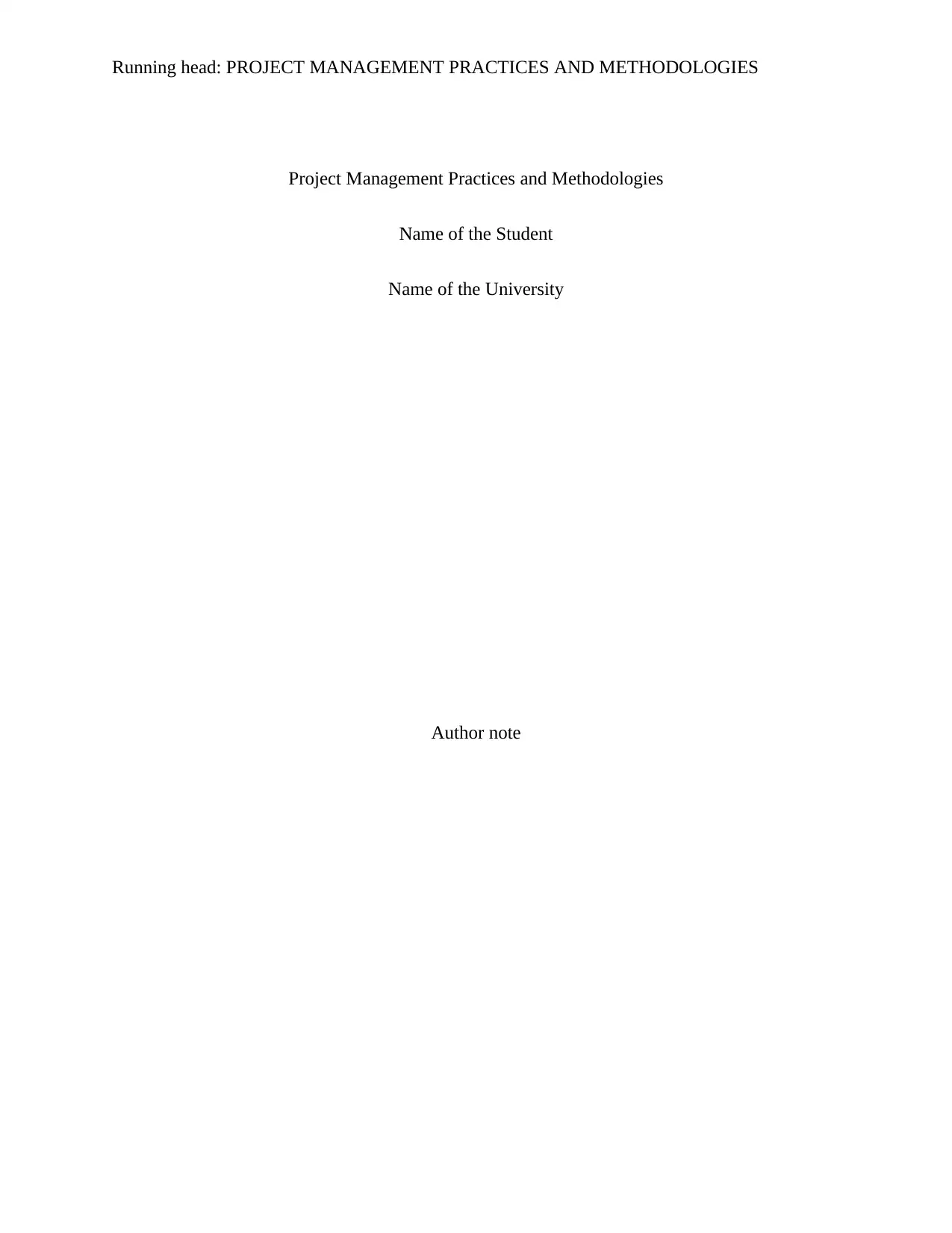
Running head: PROJECT MANAGEMENT PRACTICES AND METHODOLOGIES
Project Management Practices and Methodologies
Name of the Student
Name of the University
Author note
Project Management Practices and Methodologies
Name of the Student
Name of the University
Author note
Paraphrase This Document
Need a fresh take? Get an instant paraphrase of this document with our AI Paraphraser
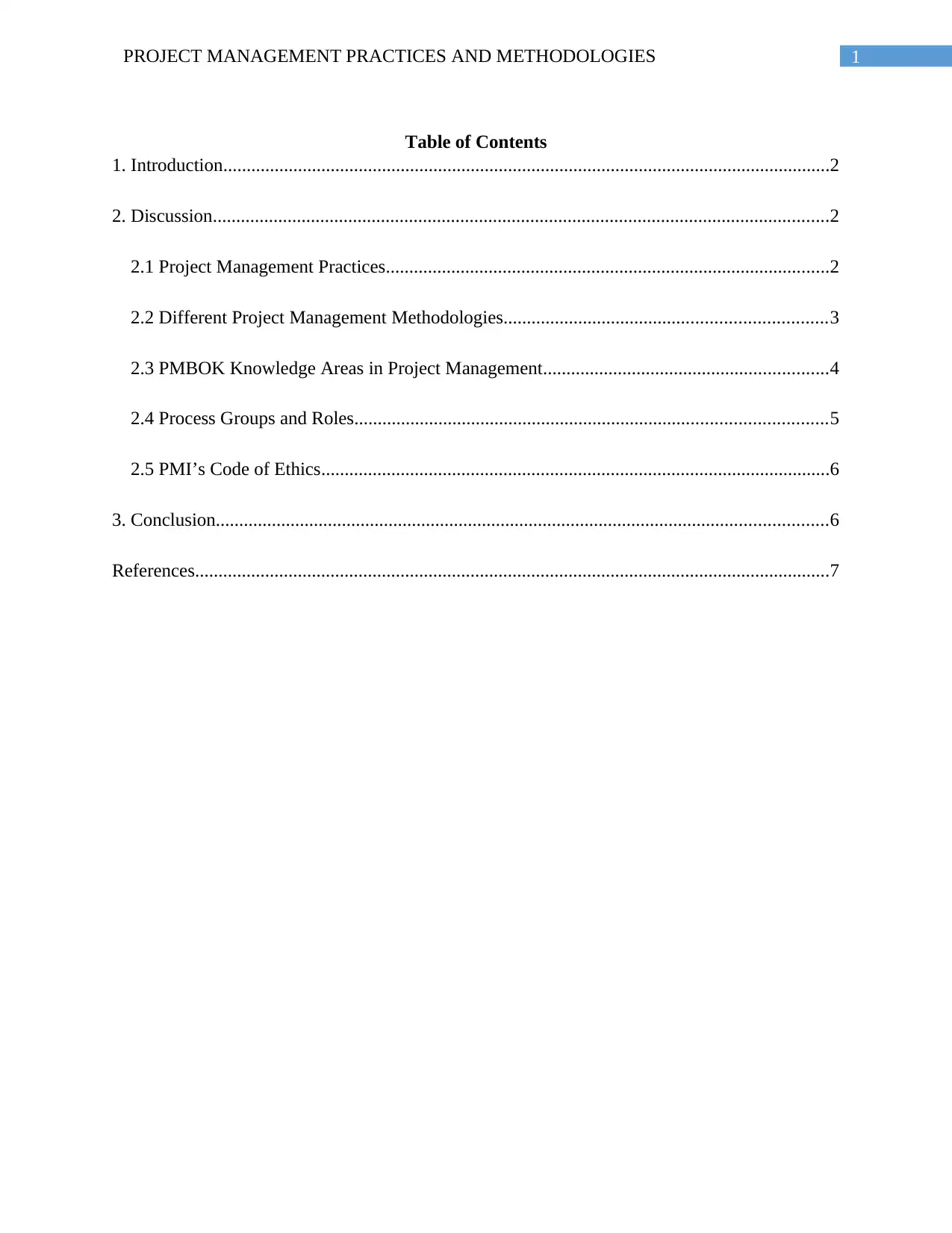
1PROJECT MANAGEMENT PRACTICES AND METHODOLOGIES
Table of Contents
1. Introduction..................................................................................................................................2
2. Discussion....................................................................................................................................2
2.1 Project Management Practices...............................................................................................2
2.2 Different Project Management Methodologies.....................................................................3
2.3 PMBOK Knowledge Areas in Project Management.............................................................4
2.4 Process Groups and Roles.....................................................................................................5
2.5 PMI’s Code of Ethics.............................................................................................................6
3. Conclusion...................................................................................................................................6
References........................................................................................................................................7
Table of Contents
1. Introduction..................................................................................................................................2
2. Discussion....................................................................................................................................2
2.1 Project Management Practices...............................................................................................2
2.2 Different Project Management Methodologies.....................................................................3
2.3 PMBOK Knowledge Areas in Project Management.............................................................4
2.4 Process Groups and Roles.....................................................................................................5
2.5 PMI’s Code of Ethics.............................................................................................................6
3. Conclusion...................................................................................................................................6
References........................................................................................................................................7
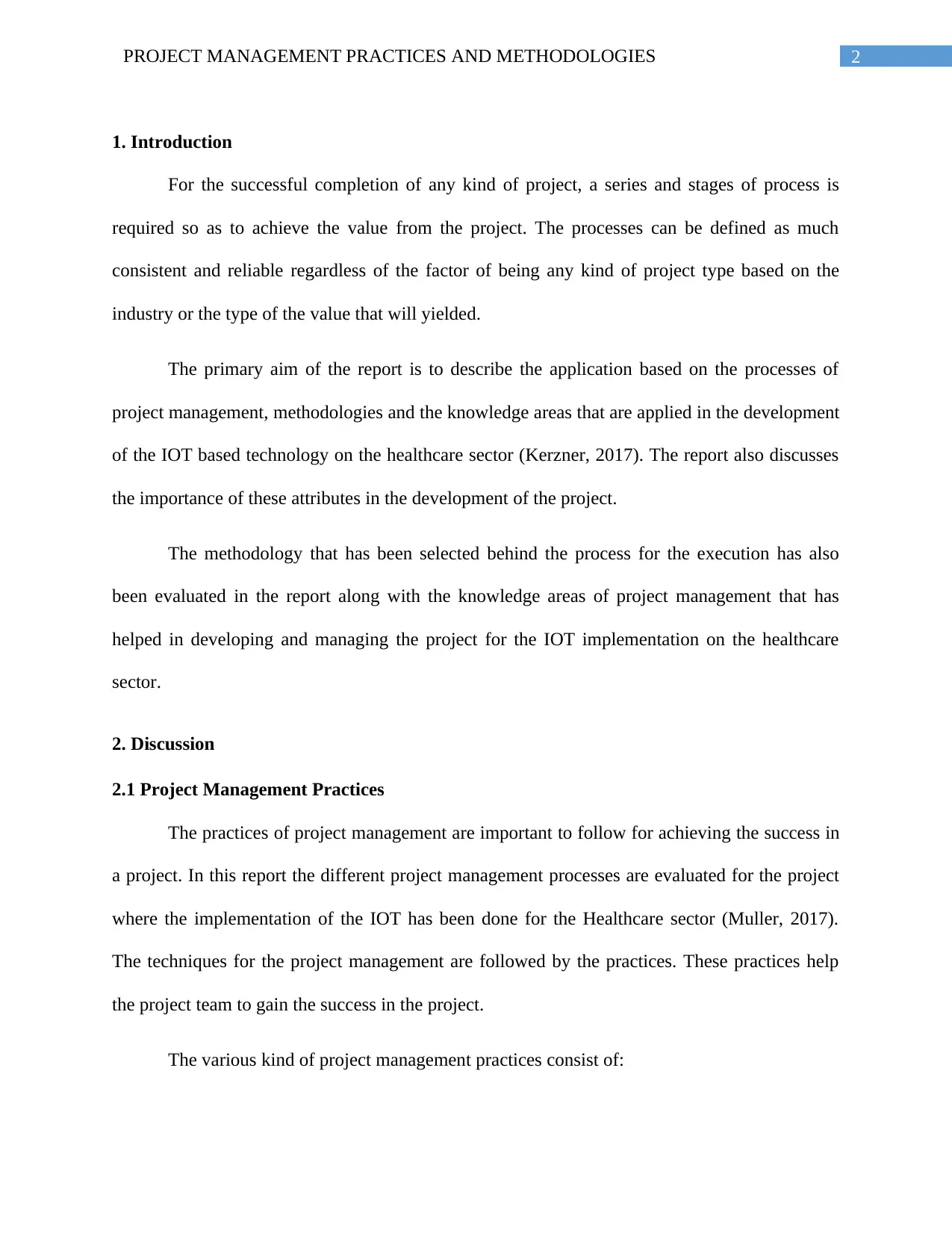
2PROJECT MANAGEMENT PRACTICES AND METHODOLOGIES
1. Introduction
For the successful completion of any kind of project, a series and stages of process is
required so as to achieve the value from the project. The processes can be defined as much
consistent and reliable regardless of the factor of being any kind of project type based on the
industry or the type of the value that will yielded.
The primary aim of the report is to describe the application based on the processes of
project management, methodologies and the knowledge areas that are applied in the development
of the IOT based technology on the healthcare sector (Kerzner, 2017). The report also discusses
the importance of these attributes in the development of the project.
The methodology that has been selected behind the process for the execution has also
been evaluated in the report along with the knowledge areas of project management that has
helped in developing and managing the project for the IOT implementation on the healthcare
sector.
2. Discussion
2.1 Project Management Practices
The practices of project management are important to follow for achieving the success in
a project. In this report the different project management processes are evaluated for the project
where the implementation of the IOT has been done for the Healthcare sector (Muller, 2017).
The techniques for the project management are followed by the practices. These practices help
the project team to gain the success in the project.
The various kind of project management practices consist of:
1. Introduction
For the successful completion of any kind of project, a series and stages of process is
required so as to achieve the value from the project. The processes can be defined as much
consistent and reliable regardless of the factor of being any kind of project type based on the
industry or the type of the value that will yielded.
The primary aim of the report is to describe the application based on the processes of
project management, methodologies and the knowledge areas that are applied in the development
of the IOT based technology on the healthcare sector (Kerzner, 2017). The report also discusses
the importance of these attributes in the development of the project.
The methodology that has been selected behind the process for the execution has also
been evaluated in the report along with the knowledge areas of project management that has
helped in developing and managing the project for the IOT implementation on the healthcare
sector.
2. Discussion
2.1 Project Management Practices
The practices of project management are important to follow for achieving the success in
a project. In this report the different project management processes are evaluated for the project
where the implementation of the IOT has been done for the Healthcare sector (Muller, 2017).
The techniques for the project management are followed by the practices. These practices help
the project team to gain the success in the project.
The various kind of project management practices consist of:
⊘ This is a preview!⊘
Do you want full access?
Subscribe today to unlock all pages.

Trusted by 1+ million students worldwide
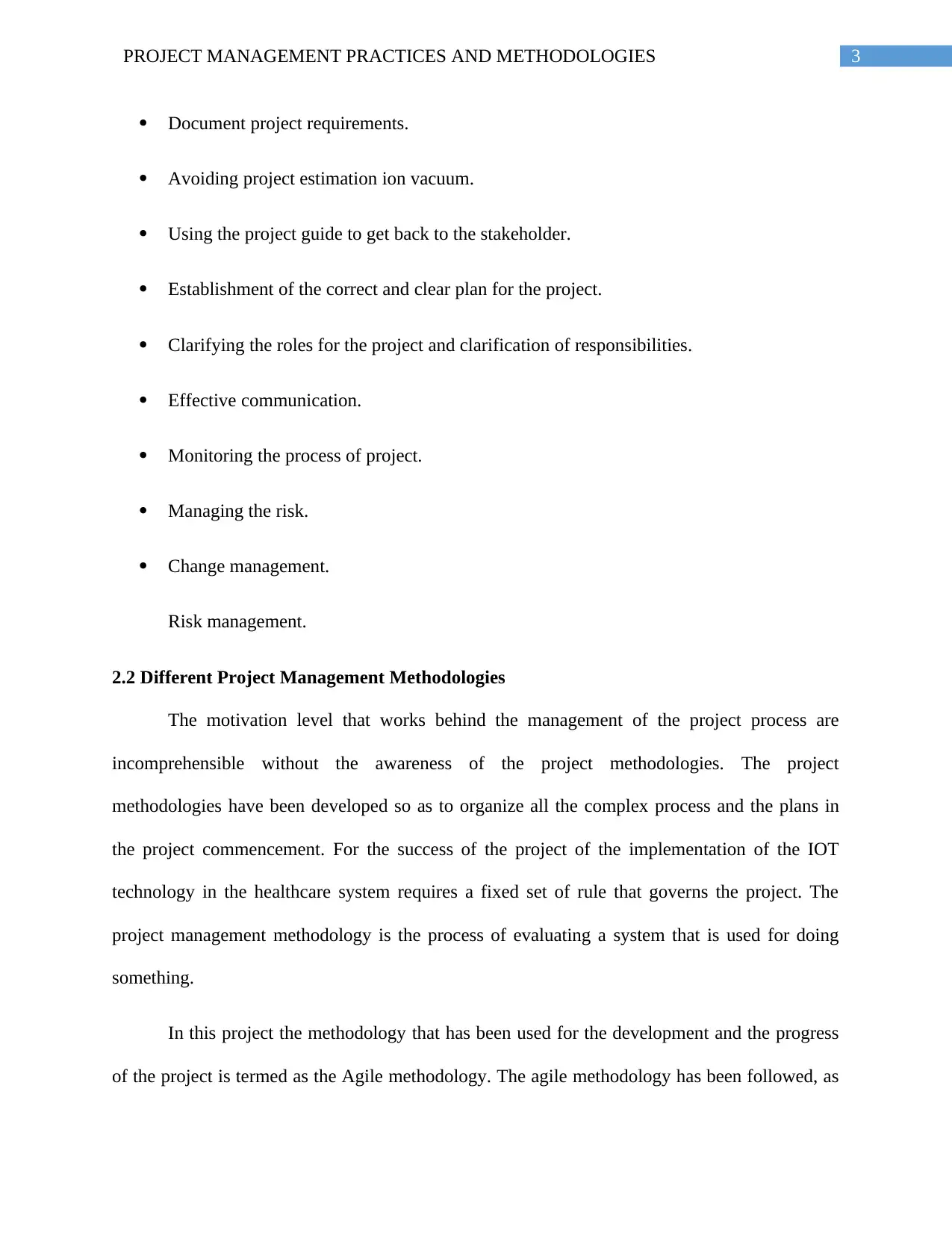
3PROJECT MANAGEMENT PRACTICES AND METHODOLOGIES
Document project requirements.
Avoiding project estimation ion vacuum.
Using the project guide to get back to the stakeholder.
Establishment of the correct and clear plan for the project.
Clarifying the roles for the project and clarification of responsibilities.
Effective communication.
Monitoring the process of project.
Managing the risk.
Change management.
Risk management.
2.2 Different Project Management Methodologies
The motivation level that works behind the management of the project process are
incomprehensible without the awareness of the project methodologies. The project
methodologies have been developed so as to organize all the complex process and the plans in
the project commencement. For the success of the project of the implementation of the IOT
technology in the healthcare system requires a fixed set of rule that governs the project. The
project management methodology is the process of evaluating a system that is used for doing
something.
In this project the methodology that has been used for the development and the progress
of the project is termed as the Agile methodology. The agile methodology has been followed, as
Document project requirements.
Avoiding project estimation ion vacuum.
Using the project guide to get back to the stakeholder.
Establishment of the correct and clear plan for the project.
Clarifying the roles for the project and clarification of responsibilities.
Effective communication.
Monitoring the process of project.
Managing the risk.
Change management.
Risk management.
2.2 Different Project Management Methodologies
The motivation level that works behind the management of the project process are
incomprehensible without the awareness of the project methodologies. The project
methodologies have been developed so as to organize all the complex process and the plans in
the project commencement. For the success of the project of the implementation of the IOT
technology in the healthcare system requires a fixed set of rule that governs the project. The
project management methodology is the process of evaluating a system that is used for doing
something.
In this project the methodology that has been used for the development and the progress
of the project is termed as the Agile methodology. The agile methodology has been followed, as
Paraphrase This Document
Need a fresh take? Get an instant paraphrase of this document with our AI Paraphraser
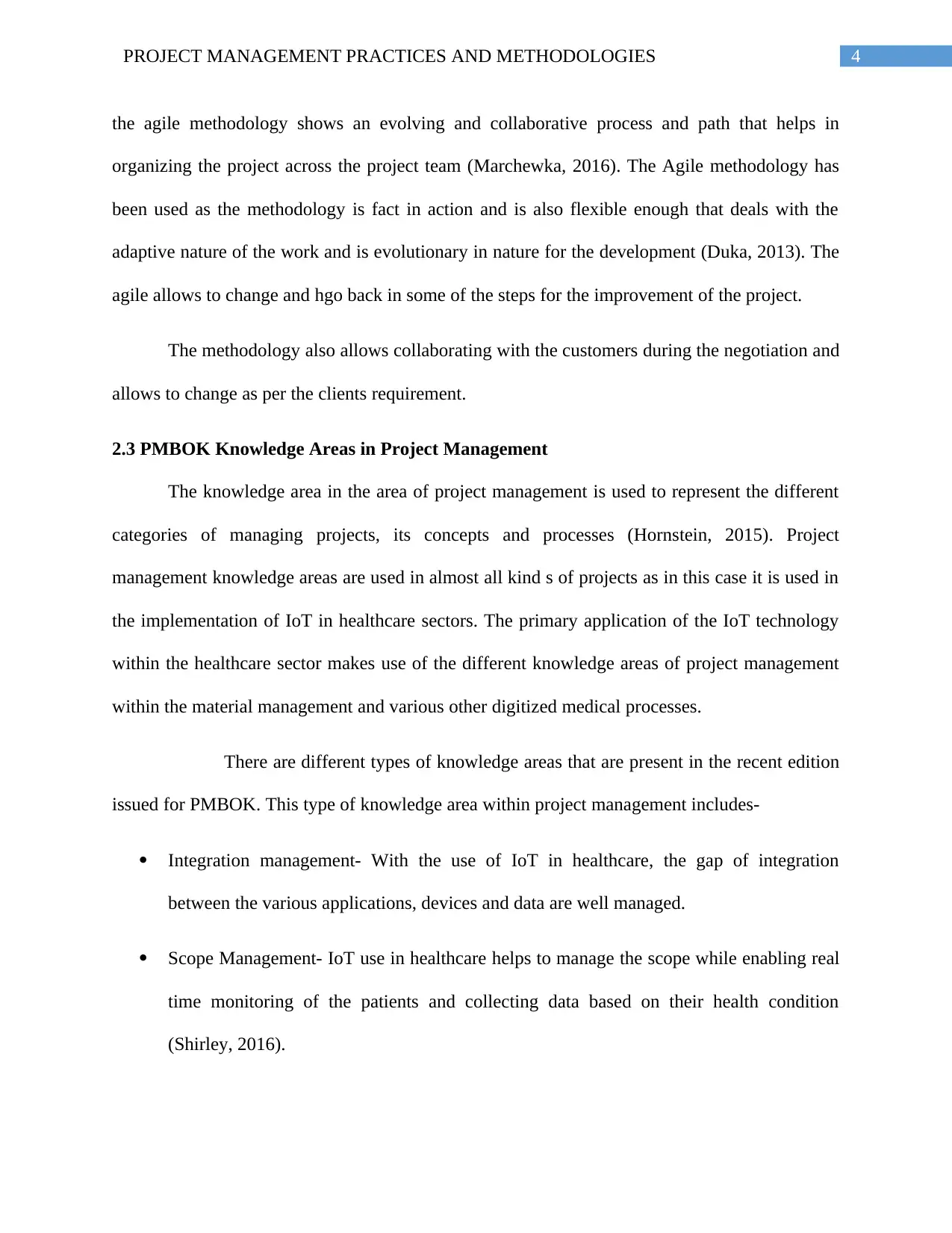
4PROJECT MANAGEMENT PRACTICES AND METHODOLOGIES
the agile methodology shows an evolving and collaborative process and path that helps in
organizing the project across the project team (Marchewka, 2016). The Agile methodology has
been used as the methodology is fact in action and is also flexible enough that deals with the
adaptive nature of the work and is evolutionary in nature for the development (Duka, 2013). The
agile allows to change and hgo back in some of the steps for the improvement of the project.
The methodology also allows collaborating with the customers during the negotiation and
allows to change as per the clients requirement.
2.3 PMBOK Knowledge Areas in Project Management
The knowledge area in the area of project management is used to represent the different
categories of managing projects, its concepts and processes (Hornstein, 2015). Project
management knowledge areas are used in almost all kind s of projects as in this case it is used in
the implementation of IoT in healthcare sectors. The primary application of the IoT technology
within the healthcare sector makes use of the different knowledge areas of project management
within the material management and various other digitized medical processes.
There are different types of knowledge areas that are present in the recent edition
issued for PMBOK. This type of knowledge area within project management includes-
Integration management- With the use of IoT in healthcare, the gap of integration
between the various applications, devices and data are well managed.
Scope Management- IoT use in healthcare helps to manage the scope while enabling real
time monitoring of the patients and collecting data based on their health condition
(Shirley, 2016).
the agile methodology shows an evolving and collaborative process and path that helps in
organizing the project across the project team (Marchewka, 2016). The Agile methodology has
been used as the methodology is fact in action and is also flexible enough that deals with the
adaptive nature of the work and is evolutionary in nature for the development (Duka, 2013). The
agile allows to change and hgo back in some of the steps for the improvement of the project.
The methodology also allows collaborating with the customers during the negotiation and
allows to change as per the clients requirement.
2.3 PMBOK Knowledge Areas in Project Management
The knowledge area in the area of project management is used to represent the different
categories of managing projects, its concepts and processes (Hornstein, 2015). Project
management knowledge areas are used in almost all kind s of projects as in this case it is used in
the implementation of IoT in healthcare sectors. The primary application of the IoT technology
within the healthcare sector makes use of the different knowledge areas of project management
within the material management and various other digitized medical processes.
There are different types of knowledge areas that are present in the recent edition
issued for PMBOK. This type of knowledge area within project management includes-
Integration management- With the use of IoT in healthcare, the gap of integration
between the various applications, devices and data are well managed.
Scope Management- IoT use in healthcare helps to manage the scope while enabling real
time monitoring of the patients and collecting data based on their health condition
(Shirley, 2016).
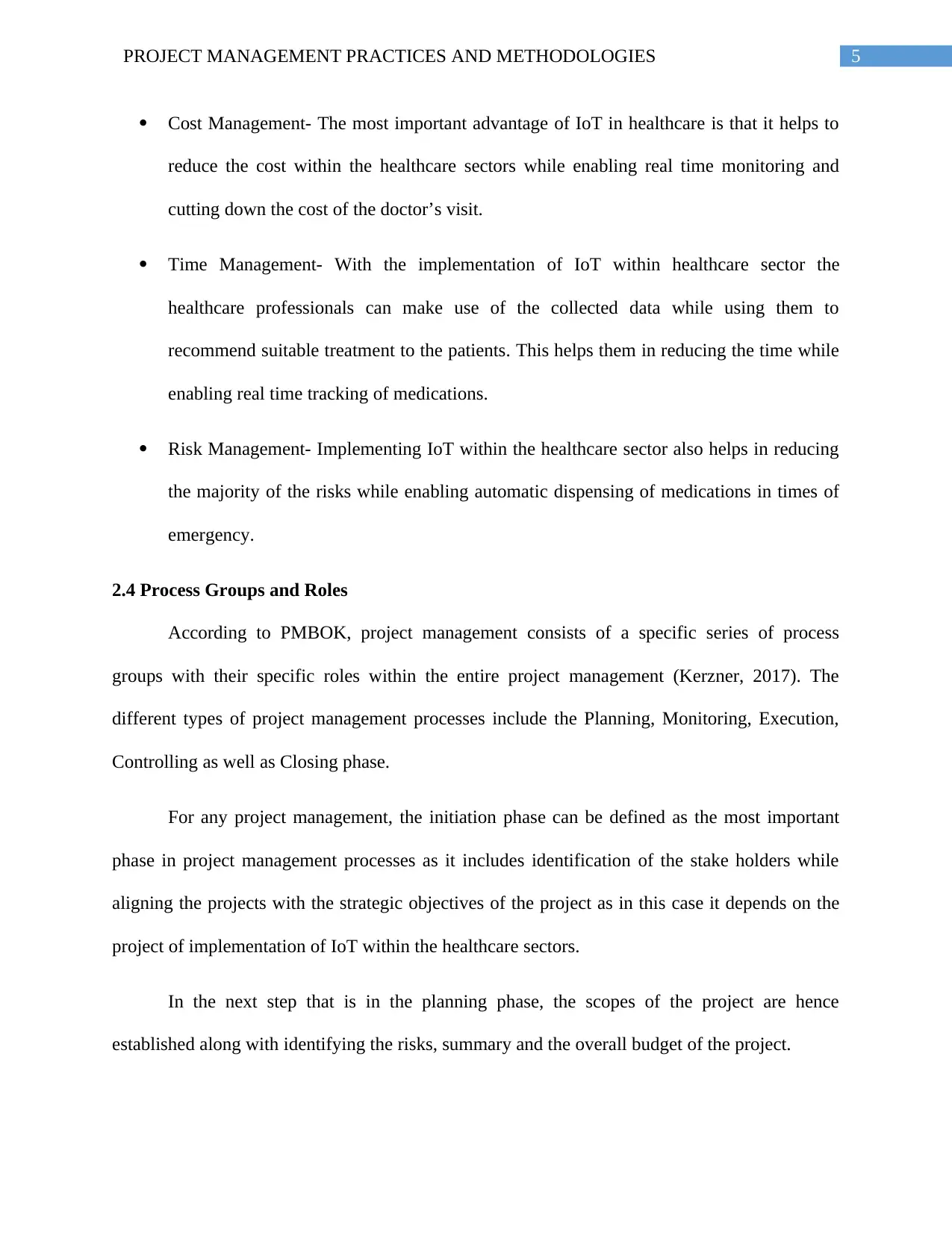
5PROJECT MANAGEMENT PRACTICES AND METHODOLOGIES
Cost Management- The most important advantage of IoT in healthcare is that it helps to
reduce the cost within the healthcare sectors while enabling real time monitoring and
cutting down the cost of the doctor’s visit.
Time Management- With the implementation of IoT within healthcare sector the
healthcare professionals can make use of the collected data while using them to
recommend suitable treatment to the patients. This helps them in reducing the time while
enabling real time tracking of medications.
Risk Management- Implementing IoT within the healthcare sector also helps in reducing
the majority of the risks while enabling automatic dispensing of medications in times of
emergency.
2.4 Process Groups and Roles
According to PMBOK, project management consists of a specific series of process
groups with their specific roles within the entire project management (Kerzner, 2017). The
different types of project management processes include the Planning, Monitoring, Execution,
Controlling as well as Closing phase.
For any project management, the initiation phase can be defined as the most important
phase in project management processes as it includes identification of the stake holders while
aligning the projects with the strategic objectives of the project as in this case it depends on the
project of implementation of IoT within the healthcare sectors.
In the next step that is in the planning phase, the scopes of the project are hence
established along with identifying the risks, summary and the overall budget of the project.
Cost Management- The most important advantage of IoT in healthcare is that it helps to
reduce the cost within the healthcare sectors while enabling real time monitoring and
cutting down the cost of the doctor’s visit.
Time Management- With the implementation of IoT within healthcare sector the
healthcare professionals can make use of the collected data while using them to
recommend suitable treatment to the patients. This helps them in reducing the time while
enabling real time tracking of medications.
Risk Management- Implementing IoT within the healthcare sector also helps in reducing
the majority of the risks while enabling automatic dispensing of medications in times of
emergency.
2.4 Process Groups and Roles
According to PMBOK, project management consists of a specific series of process
groups with their specific roles within the entire project management (Kerzner, 2017). The
different types of project management processes include the Planning, Monitoring, Execution,
Controlling as well as Closing phase.
For any project management, the initiation phase can be defined as the most important
phase in project management processes as it includes identification of the stake holders while
aligning the projects with the strategic objectives of the project as in this case it depends on the
project of implementation of IoT within the healthcare sectors.
In the next step that is in the planning phase, the scopes of the project are hence
established along with identifying the risks, summary and the overall budget of the project.
⊘ This is a preview!⊘
Do you want full access?
Subscribe today to unlock all pages.

Trusted by 1+ million students worldwide
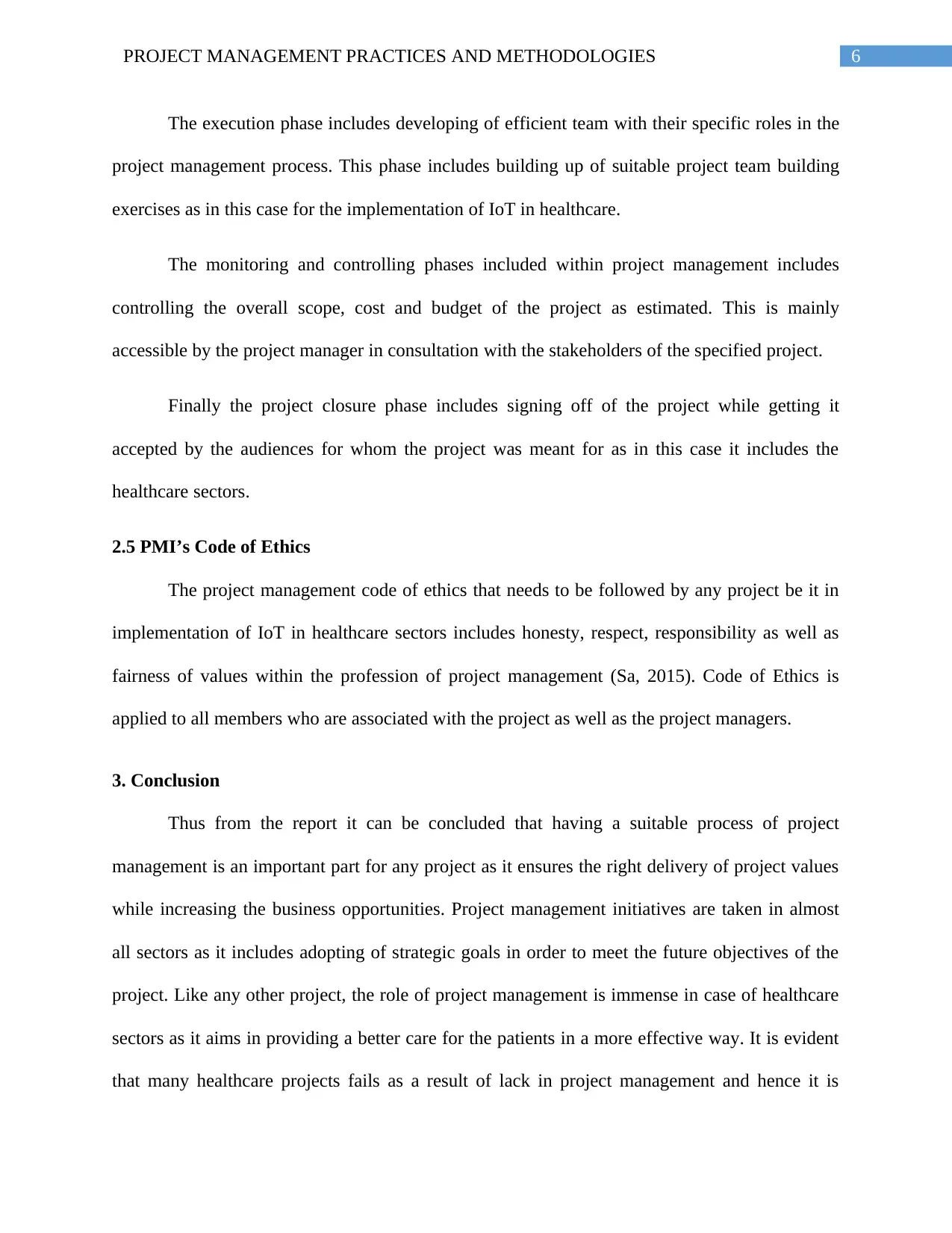
6PROJECT MANAGEMENT PRACTICES AND METHODOLOGIES
The execution phase includes developing of efficient team with their specific roles in the
project management process. This phase includes building up of suitable project team building
exercises as in this case for the implementation of IoT in healthcare.
The monitoring and controlling phases included within project management includes
controlling the overall scope, cost and budget of the project as estimated. This is mainly
accessible by the project manager in consultation with the stakeholders of the specified project.
Finally the project closure phase includes signing off of the project while getting it
accepted by the audiences for whom the project was meant for as in this case it includes the
healthcare sectors.
2.5 PMI’s Code of Ethics
The project management code of ethics that needs to be followed by any project be it in
implementation of IoT in healthcare sectors includes honesty, respect, responsibility as well as
fairness of values within the profession of project management (Sa, 2015). Code of Ethics is
applied to all members who are associated with the project as well as the project managers.
3. Conclusion
Thus from the report it can be concluded that having a suitable process of project
management is an important part for any project as it ensures the right delivery of project values
while increasing the business opportunities. Project management initiatives are taken in almost
all sectors as it includes adopting of strategic goals in order to meet the future objectives of the
project. Like any other project, the role of project management is immense in case of healthcare
sectors as it aims in providing a better care for the patients in a more effective way. It is evident
that many healthcare projects fails as a result of lack in project management and hence it is
The execution phase includes developing of efficient team with their specific roles in the
project management process. This phase includes building up of suitable project team building
exercises as in this case for the implementation of IoT in healthcare.
The monitoring and controlling phases included within project management includes
controlling the overall scope, cost and budget of the project as estimated. This is mainly
accessible by the project manager in consultation with the stakeholders of the specified project.
Finally the project closure phase includes signing off of the project while getting it
accepted by the audiences for whom the project was meant for as in this case it includes the
healthcare sectors.
2.5 PMI’s Code of Ethics
The project management code of ethics that needs to be followed by any project be it in
implementation of IoT in healthcare sectors includes honesty, respect, responsibility as well as
fairness of values within the profession of project management (Sa, 2015). Code of Ethics is
applied to all members who are associated with the project as well as the project managers.
3. Conclusion
Thus from the report it can be concluded that having a suitable process of project
management is an important part for any project as it ensures the right delivery of project values
while increasing the business opportunities. Project management initiatives are taken in almost
all sectors as it includes adopting of strategic goals in order to meet the future objectives of the
project. Like any other project, the role of project management is immense in case of healthcare
sectors as it aims in providing a better care for the patients in a more effective way. It is evident
that many healthcare projects fails as a result of lack in project management and hence it is
Paraphrase This Document
Need a fresh take? Get an instant paraphrase of this document with our AI Paraphraser
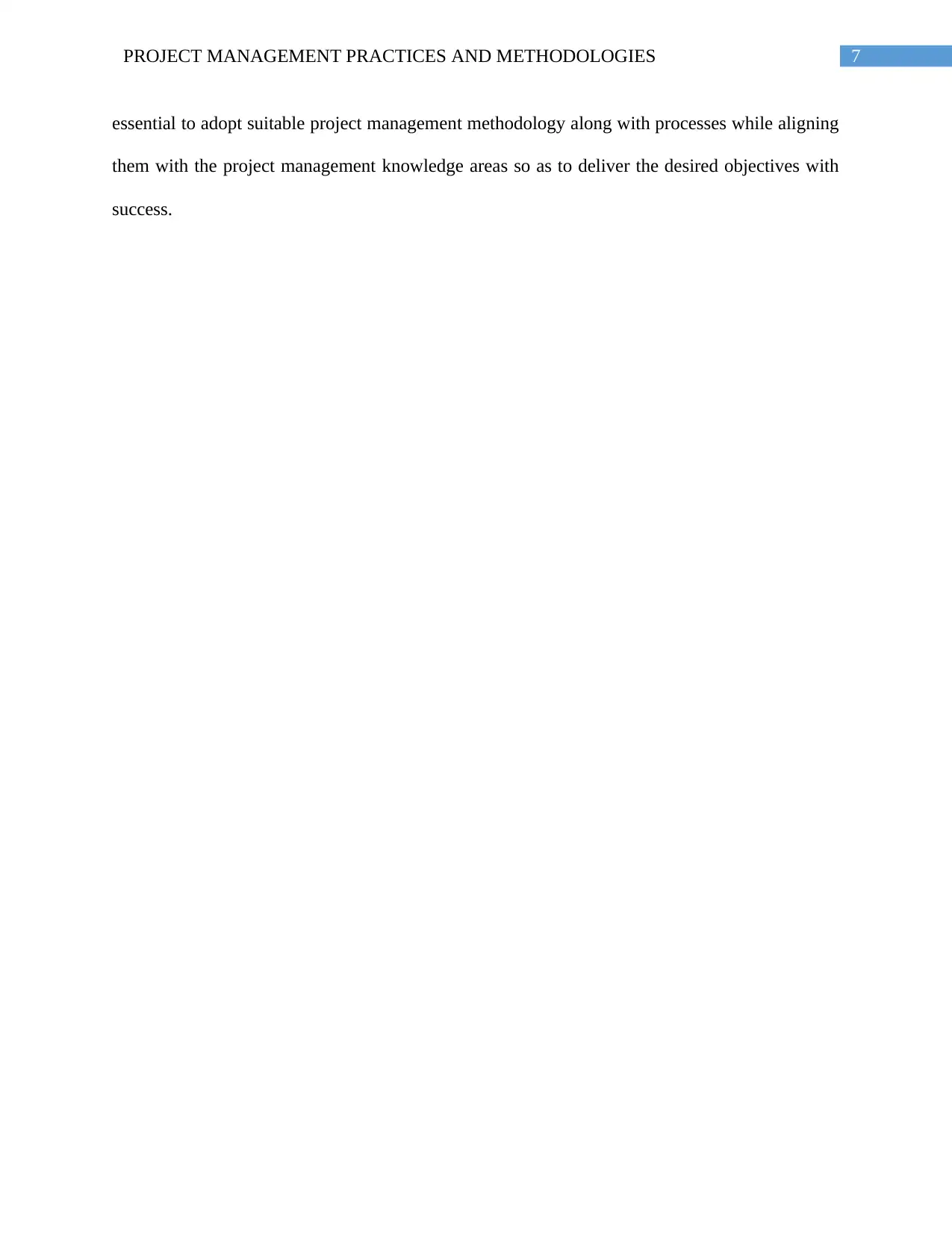
7PROJECT MANAGEMENT PRACTICES AND METHODOLOGIES
essential to adopt suitable project management methodology along with processes while aligning
them with the project management knowledge areas so as to deliver the desired objectives with
success.
essential to adopt suitable project management methodology along with processes while aligning
them with the project management knowledge areas so as to deliver the desired objectives with
success.
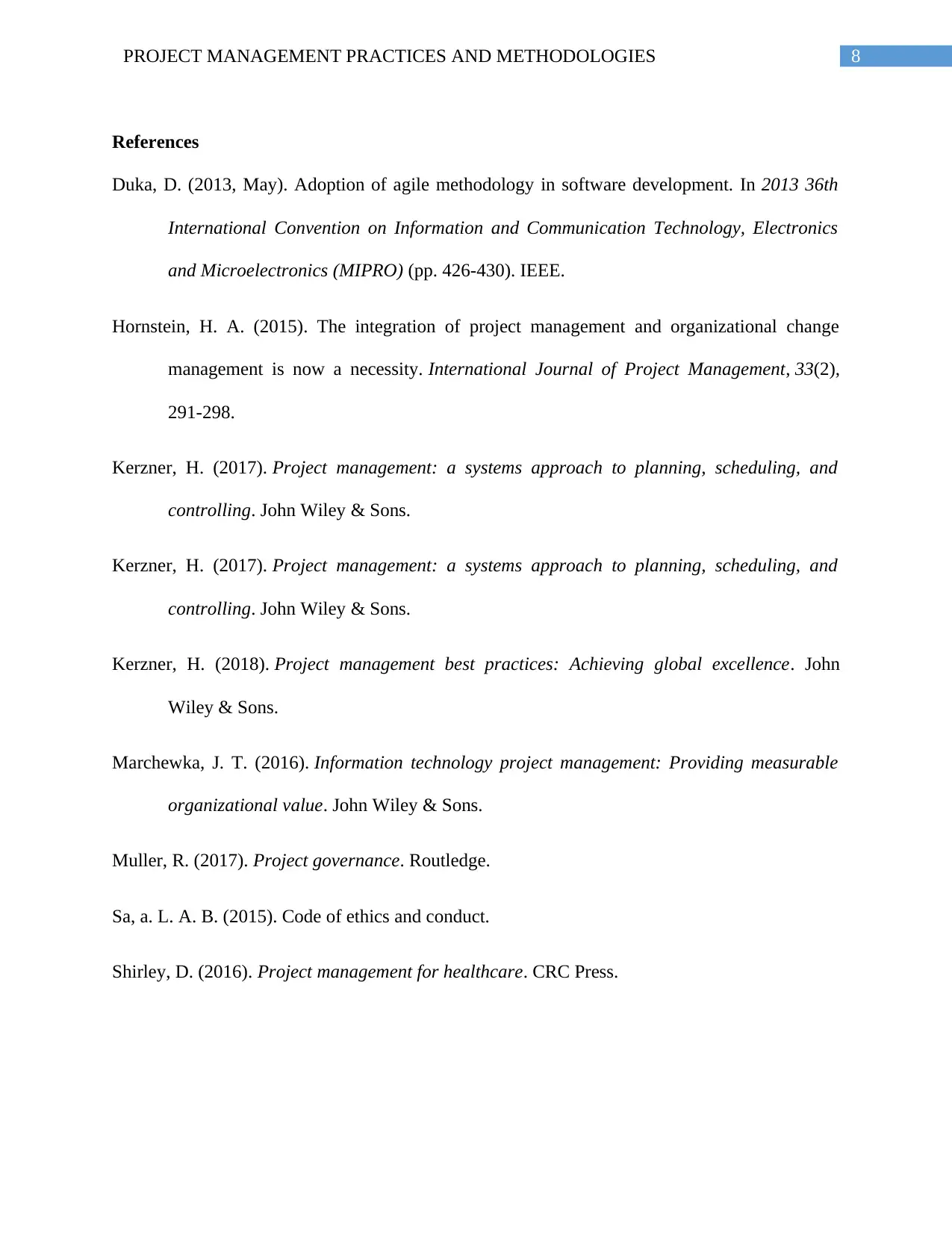
8PROJECT MANAGEMENT PRACTICES AND METHODOLOGIES
References
Duka, D. (2013, May). Adoption of agile methodology in software development. In 2013 36th
International Convention on Information and Communication Technology, Electronics
and Microelectronics (MIPRO) (pp. 426-430). IEEE.
Hornstein, H. A. (2015). The integration of project management and organizational change
management is now a necessity. International Journal of Project Management, 33(2),
291-298.
Kerzner, H. (2017). Project management: a systems approach to planning, scheduling, and
controlling. John Wiley & Sons.
Kerzner, H. (2017). Project management: a systems approach to planning, scheduling, and
controlling. John Wiley & Sons.
Kerzner, H. (2018). Project management best practices: Achieving global excellence. John
Wiley & Sons.
Marchewka, J. T. (2016). Information technology project management: Providing measurable
organizational value. John Wiley & Sons.
Muller, R. (2017). Project governance. Routledge.
Sa, a. L. A. B. (2015). Code of ethics and conduct.
Shirley, D. (2016). Project management for healthcare. CRC Press.
References
Duka, D. (2013, May). Adoption of agile methodology in software development. In 2013 36th
International Convention on Information and Communication Technology, Electronics
and Microelectronics (MIPRO) (pp. 426-430). IEEE.
Hornstein, H. A. (2015). The integration of project management and organizational change
management is now a necessity. International Journal of Project Management, 33(2),
291-298.
Kerzner, H. (2017). Project management: a systems approach to planning, scheduling, and
controlling. John Wiley & Sons.
Kerzner, H. (2017). Project management: a systems approach to planning, scheduling, and
controlling. John Wiley & Sons.
Kerzner, H. (2018). Project management best practices: Achieving global excellence. John
Wiley & Sons.
Marchewka, J. T. (2016). Information technology project management: Providing measurable
organizational value. John Wiley & Sons.
Muller, R. (2017). Project governance. Routledge.
Sa, a. L. A. B. (2015). Code of ethics and conduct.
Shirley, D. (2016). Project management for healthcare. CRC Press.
⊘ This is a preview!⊘
Do you want full access?
Subscribe today to unlock all pages.

Trusted by 1+ million students worldwide
1 out of 9
Related Documents
Your All-in-One AI-Powered Toolkit for Academic Success.
+13062052269
info@desklib.com
Available 24*7 on WhatsApp / Email
![[object Object]](/_next/static/media/star-bottom.7253800d.svg)
Unlock your academic potential
Copyright © 2020–2026 A2Z Services. All Rights Reserved. Developed and managed by ZUCOL.




